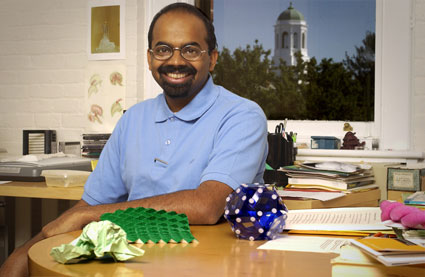Contribute
| Lokvani Talks To MacArthur "Genius" L. Mahadevan |
Ranjani Saigal
10/28/2009
L. Mahadevan is a mathematician who applies complex mathematical analyses to a variety of seemingly simple, but vexing, questions across the physical and biological sciences — how cloth folds when draped, how skin wrinkles, how flags flutter, how Venus flytraps snap closed. Through his explorations of shape and motion, in many different material types, sizes, and time frames, Mahadevan strives to identify commonalities of the fundamental nonlinear and nonequilibrium behavior driving them. One line of his research considers the relationship between the biochemistry and mechanics of structural molecules that form polymers, such as actin, within the cell. These investigations have parallels in his work on the hydrodynamics and elasticity of thin films and sheets (e.g., made of fabric). Mahadevan also considers properties of materials at larger scales, such as cell shape, adhesion, and migration in developmental biology, avalanche dynamics, or the role of water in determining the tensile characteristics of plants. Though he searches for and elucidates mathematical principles underpinning these complex behaviors, his focus remains on developing hypotheses that can be confirmed or rejected empirically in the lab. The unusually broad scope of his theoretical and experimental investigations defies facile categorization, but they are linked by an effort to discover the geometric and mechanical principles that determine the behavior of complex biological and physical systems.
L. Mahadevan received a B.Tech. (1986) from the Indian Institute of Technology in Madras, an M.S. (1987) from the University of Texas at Austin, and an M.S. (1992) and Ph.D. (1995) from Stanford University. Since 2003, he has been affiliated with Harvard University, where he is currently the De Valpine Professor of Applied Mathematics. He served previously as an assistant and associate professor (1996-2000) in the Department of Mechanical Engineering at Massachusetts Institute of Technology and as the Schlumberger Professor of Complex Physical Systems (2001-2003) in the Department of Applied Mathematics and Theoretical Physics and a fellow of Trinity College at the University of Cambridge. He holds visiting professorships at the University of Oxford’s Mathematics Institute and the National Center for Biological Sciences in Bangalore, India.
He talked to Lokvani about his work
Congratulations on being named a 2009 MacArthur Fellow. What does this award mean to you?
It is nice to have recognition for a field that is not often in the limelight - even though it is behind the scenes in many areas of science and engineering. I was lucky to be chosen as a representative, as there are many who are more deserving.
What motivated you to switch from Engineering to Applied Mathematics?
It is not much of a switch really. Applied Mathematics underlies much, if not all of good engineering and science. What I do is simply to shift the focus on understanding rather than designing and building.
You seem to have worked on problems to define how flowers bloom and honey coils. Why do you think it is important to understand the process of a blooming of a flower in mathematical terms?
Why is it important to listen to music and read literature ? Or paint ? Or write poetry ? Mathematics and science are one more expression of the creativity and curiosity of humans. Need I say more ?
It seems like the logical conclusion of you research may end up demystifying the great mysteries of nature. Is my presumption right and if so can you then predict natural events that we may have thus far consider unpredictable?
Mystery and magic precede careful scientific investigations. Predictability is part of this - one step at a time.
Do you imagine ever being able to explain "life" in mathematical terms?
Perhaps, collectively, we will as scientists be able to do this, but we are still some way from this goal.
You seem to attribute your success to the great teachers you have had . Who are the teachers and mentors that have contributed to your success?
My own students and postdocs have been excellent teachers and continue to be so. My PhD advisor, Professor Joesph Keller of Stanford is an extraordinary teacher who taught by example.
Math is often considered as a difficult subject in school and in the US many students seem to turn away from it. What can educators do to make math exciting for high schoolers?
Bring it to life by showing how mathematics is a natural outcome of precise thinking about simple, everyday things, not a dry subject that requires you to do sums and then forget about it until the next homework.
Any special message for the youngsters in the community who may be considering a career in the field of applied mathematics?
Applied Mathematics is simply put a quantitative way of thinking about phenomena at all scales and in all disciplines. So it is everywhere and is easy to start in - just do not be afraid of making mistakes .. there is no better way to learn.
Thank you for your time.
Thank you
You may also access this article through our web-site http://www.lokvani.com/
